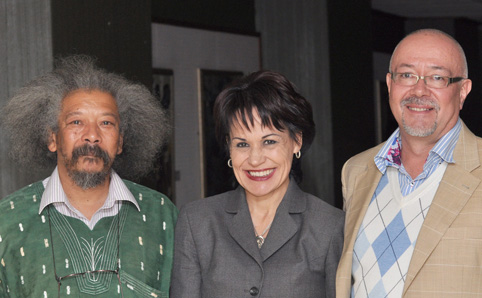Latest News Archive
Please select Category, Year, and then Month to display items
02 January 2025
|
Story Gerda-Marie van Rooyen
|
Photo Supplied
 Leading the research in South Africa is Prof Linus Franke from the Department of Soil, Crop and Climate Sciences.
Leading the research in South Africa is Prof Linus Franke from the Department of Soil, Crop and Climate Sciences.
Scientists are actively pursuing the successful breeding of diploid hybrid potatoes from inbred lines. This is expected to revolutionise potato breeding as it holds the key to rapid genetic progress. It will introduce new varieties for commercialisation through seed. Currently, existing potato variants have a gene that renders self-pollinated seeds infertile.
Prof Linus Franke, an academic in the Department of Soil, Crop and Climate Sciences at the UFS, is leading the research in South Africa. “This technology allows the production of genetically uniform potato seed that is easy to transport and largely disease-free.” He says this differs from conventional breeding whereby only vegetative propagation is possible due to tetraploid varieties in potatoes. It also risks carrying pests and diseases from one generation to the next – leading to the accumulation of pests and diseases with each round of multiplication.
Seed innovation
Prof Franke explains that Solynta BV, a seed company based in the Netherlands that produces potato varieties that can be grown from seed, has included South Africa in their research efforts because it is one of Africa’s largest producers and exporters. Through his academic relationship with Wageningen University and Research, a Dutch institution renowned for its agricultural endeavours and food production, the UFS became involved in researching hybrid potatoes grown from seed.
Diploid seeds containing two sets of chromosomes allow easier gene manipulation to increase predictability and speedier genetic progress. The breeding approach enables the incorporation of tolerance to pests, diseases, abiotic stresses (cold, heat, drought) and other desired genetic traits.
Although Prof Franke is optimistic about this research, he is not blind to disadvantages. “Potato seeds are tiny and have little energy reserves, making it harder to grow potatoes from seed than from tubers.” He says potatoes from seed will take longer to cultivate than tubers, as farmers need to grow plantlets from seeds first, adding six weeks to the growing period. “It is possible that commercial farmers can grow potatoes directly from seed. Alternatively, perhaps more likely, specialised growers will produce tubers of potatoes from seed; these tubers are then sold as seed tubers to other potato farmers, who then continue their normal practices of producing potatoes for the market from tubers.”
Financial benefits
Prof Franke says farmers have reason to get excited. “Seed potatoes will reduce input costs, as varieties with enhanced tolerance to pests and diseases require less pesticides. Planting one hectare of potatoes requires three to four tonnes of potato tubers, but only one 25 g packet of potato seeds.” Since potatoes are a more valuable commodity than maize, this technology might also increase farmers’ income potential.
UFS outlines research achievements
2011-09-02
|

|
|
At the launch of the 2010 Annual Research Report, were from the left: Mr Robert Kriger, the director for Policy and Strategy at the National Research Foundation (NRF); Prof. Driekie Hay, Vice-Rector: Academic and Prof. Frans Swanepoel, Senior Director: Research Development.
Photo: Stephen Collett
|
The University of the Free State (UFS) is well on course for delivery on its most important academic duty as a research university. This was the message that came forward at the launch of the 2010 Annual Research Report of the UFS on 30 August 2011.
Speakers at the launch, which included Prof. Jonathan Jansen, Vice-Chancellor and Rector, as well as Prof. Driekie Hay, Vice-Rector: Academics outlined the key strategies and achievements of the UFS for the 2010 academic year. This included the establishment of a Postgraduate School at the UFS, the first of its kind at a public university in South Africa. Prof. Hay told guests that the aim of the Postgraduate School was to broaden research and deepens scholarship on postgraduate education in the country. She highlighted some initiatives the UFS undertook in 2010 to build and maintain its intellectual capital. Some of these initiatives included the appointment of seven senior professors and recruiting more female and black scholars and academics.
Also speaking at the event was Mr Robert Kriger, the director for Policy and Strategy at the National Research Foundation (NRF). Kriger reflected on the brilliant minds of scholars such as Archie Mafeje, Lewis Nkosi and Dennis Brutus and argued for efforts to increase the country’s research output.
Some highlights of the 2010 Annual Research Report:
- The total funding available for research at the UFS increased from approximately R199 million in 2009 to just over R210 million in 2010. A total of R31.8 million was made available from central university funds.
- In 2010 the UFS was home to 92 NRF-rated researchers. During 2010, four researchers applied for re-evaluation and of these, two improved their rating, while a further five received a first-time rating.
- The Faculty of Natural and Agricultural Sciences continue to be the most prolific producer of publications in accredited journals, while the Faculty of Education has shown a 54% increase in its publication output.
- Staff members in the Physics department at the UFS Qwaqwa Campus published 22 papers in international peer-reviewed journals during 2010.
- Also at the Qwaqwa Campus: Ms Khethiwe Mtshali,a postgraduate student in the parasitology research unit of the Department of Zoology and Entomology, received a best Honours presenter award at the 1st Annual Research symposium of the National Zoological Gardens of South Africa.